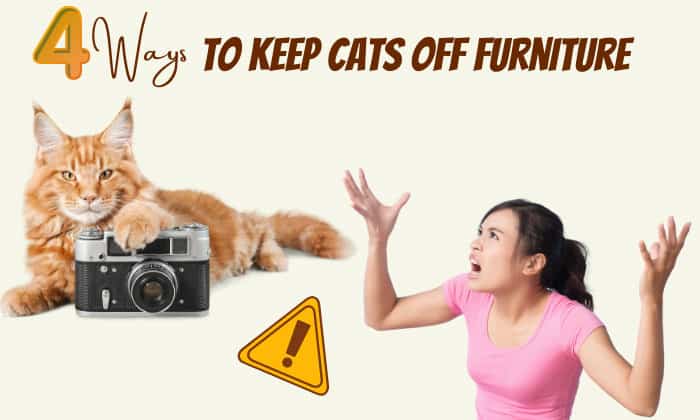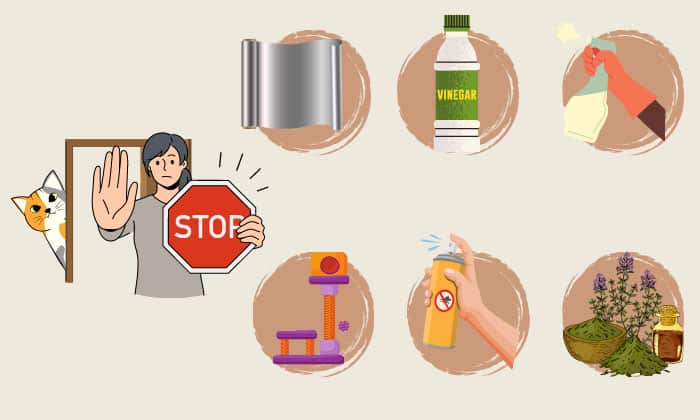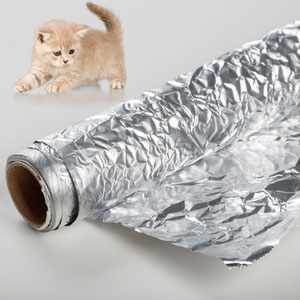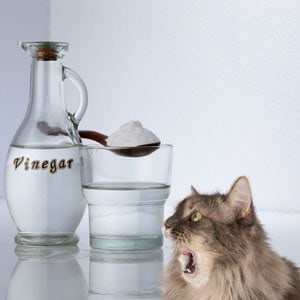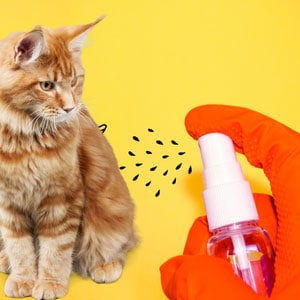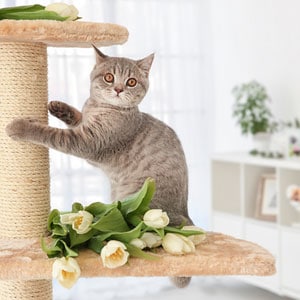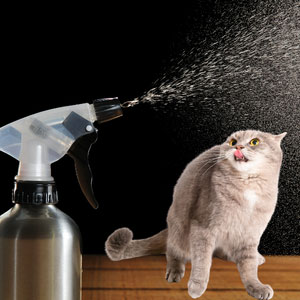Cats are calm creatures, but they can wreak havoc once they jump on tables, couches, and countertops. They scratch things to the point of destruction or lie in high places, refusing to leave.
To combat this problem, we listed some helpful tips on how to keep cats off furniture.
Cats do not have good grip, so they avoid slippery surfaces. To keep your cats off furniture, cover it with aluminum foil.
You can also make a repellent spray using the scents that cats hate.
Table of Contents
Proven Ways to Keep Your Cats Off Furniture
To deter cats from furniture, you will need one or several of the following:
- Aluminum foil or any slippery material
- Vinegar and cotton balls
- Citrus peels
- Water
- Spray Bottle
- Cat Tower
- Rosemary And Thyme Oil
- Whistle (or anything that can make loud noises)
1. Aluminum Foil
Cats hate walking on slippery surfaces as their claws cannot grip in such. So, take advantage of this weakness and line your countertop and tables with aluminum foil.
You can also use plastic or other slippery materials to keep your cats away from your furniture. These materials are inexpensive and usually available in kitchens. So, you will have a fast method to keep cats off counters naturally.
2. Vinegar
There is no denying that some people dislike the smell of vinegar. Cats, on the other hand, have a sense of smell 14 times stronger than humans. Their strong sense of smell makes the odor of vinegar overwhelming, so they hate it.
So, you can prevent your cats from making a bed out of your tables and chairs with vinegar. Soak cotton balls in vinegar diluted with water and place them on top of furniture where your cats often hang out.
3. Homemade Spray
Cats’ sensitivity to smell does not end in vinegar. Your feline friend abhors anything that smells citrusy, so you can make a homemade spray using an orange or lemon peel and a cup of boiling water.
Combine these ingredients in a mason jar, let it steep for 24 hours, and spray it on the furniture off-limits to your cats.
However, never use essential oils to keep your feline friends off your furniture. Essential oils are toxic to cats and can cause respiratory problems when smelled or licked.
4. Cat Tower
To keep cats off tables and furniture, you need to give them a spot of their own. If other home remedies to keep cats away from your furniture do not work, investing in a cat tower is ideal.
A cat tower is an all-in-one solution, as it is both a scratch tool and a platform. Therefore, it keeps your cats entertained.
In the wild, felines sit in high places to observe their surroundings. Domesticated cats still have this primal instinct, so they like sitting on chairs, tables, and countertops.
By giving your feline friends their own piece of furniture, they will leave yours alone.
5. Cat Repellent Spray
You can purchase a cat repellent for furniture online if you do not like the smell of vinegar or citrus lingering in your home. These repellents have smells ranging from bitter, herby, and unpleasant scents for your felines.
When choosing a spray to keep cats away from furniture, ensure that you go for the non-toxic and minimally aversive one. While you want to keep your cats away from certain areas of your home, you do not want to hurt them using your deterrent methods.
6. Rosemary And Thyme Oil
While essential oils are toxic for cats, rosemary and thyme are exceptions. So, you can use these scents to keep cats off furniture.
These herbs are pungent, and the highly-developed sense of smell felines have intensifies their smell.
To make your spray, get a spritz bottle and fill it with water. Add ten drops of rosemary or thyme essential oil, shake, and use it as a cat deterrent for furniture.
Other Helpful Tips
1. Make Noises
Making noises is another solution if you do not want to use scents to keep cats off tables and furniture. Keep a whistle with you and blow it whenever you catch your cats climbing on your furniture.
The noise should be louder than the sound level your feline friends can tolerate. You also need to keep an eye on your pets and catch them every time they sit on your sofa; otherwise, this trick will not work.
2. Use Double-Sided Tape
If you do not mind your furniture being temporarily sticky, place double-sided tape on the areas your cats like to sit on. Cats are very clean creatures, so they dislike things sticking to their fur.
Can You Train a Cat to Stay Off Furniture?
Cats are intelligent animals, so you can train them to stay off your furniture.
Reddit users say spraying their fury companions with water whenever they try to get on furniture is an effective training method. It is common knowledge that felines hate water, so it can keep a cat off the couch.
When you spray your cats with water, you are telling them that you do not like their behavior. This form of training corrects their undesirable acts, allowing them to learn in the long run.
However, do not use punishments to keep a cat off the sofa, as they can cause fear and owner avoidance.
Conclusion
Having your cats nearby feels nice. However, it can also be frustrating when they scratch your furniture and leave irreparable damage. Whatever happens, never use physical force to drive your feline friends away from your chairs and tables.
Moreover, keeping cats off of furniture involves using things and scents that they do not like. While cats can be challenging to deal with, always use the most humane way to discipline them.
We hope you learned some useful tips from this article so that you, your cats, and your furniture can live harmoniously. Share this post with your fellow cat owners to teach them how to keep cats off furniture.
Read more: How to keep cats out of indoor plants, or Christmas trees?

I am Amy Sawy, a Doctor of Veterinary Medicine (DVM) graduate from the University of Kansas. y husband, Dr. Plummer, and I own a veterinary clinic in Phillipsburg, Kansas. In addition to my professional background, I am a devoted pet owner myself, with a household that includes dogs, rodents, and most notably, cats – a total of five felines in my home.
In 2020, I joined an organization as a professional writer, leveraging my experience and collaborating with my team to deliver the most valuable information for your cat’s care.


